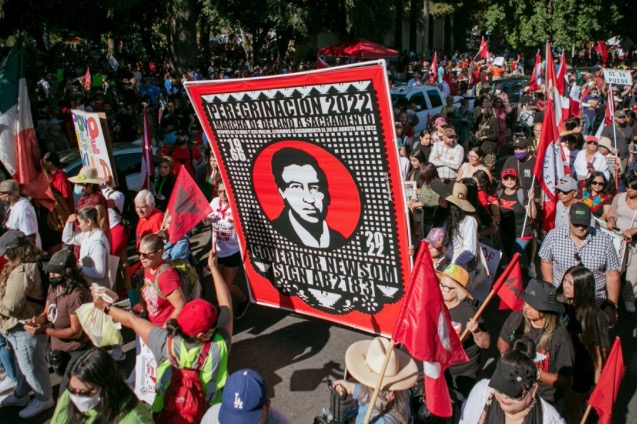CommentsSACRAMENTO HAPPENINGS - With a midnight Friday deadline to determine the fate of hundreds of bills on his desk, Gov. Gavin Newsom has been a busy man.
On Wednesday, Newsom unexpectedly showed up at the vigil that members of the United Farm Workers union have been holding outside the state Capitol since late August, when they completed a 355-mile march to Sacramento urging him to sign a bill that would make it easier for farmworkers to vote in union elections — and signed it.
The move came as a surprise to many Capitol onlookers, given that Newsom’s office had repeatedly said the governor was opposed to the bill as written. But strong pressure from President Joe Biden and prominent Latino labor leaders may have helped change his mind, along with a deal Newsom struck with key unions to pass legislation next year containing “clarifying language” to address some of the governor’s concerns around implementation and voting integrity. CalMatters’ Jeanne Kuang has more on what that means and the significance of Newsom’s signature.
Newsom’s Sacramento bill signing came after a morning trip to San Francisco, where he gave his stamp of approval to a package of housing bills that includes two complementary proposals to make it easier to build housing on land zoned for commercial use. Before signing the bills, Newsom described housing affordability as California’s “original sin,” vowing that this marked the moment “not to give the same speech and expect the same applause, but to begin to do something about it.”
- Also in the housing package: a bill to exempt public college and university housing from the requirements of the California Environmental Quality Act, the state’s landmark environmental protection law. The bill aims to address California’s chronic student housing crisis by blocking developments from being hit with environmental lawsuits that in the past have slowed down dorm construction and almost capped enrollment at UC Berkeley.
That’s not all: Newsom signed additional stacks of bills Wednesday, including a host of water and drought-related proposals. But Wednesday night, he announced a veto of a bill to provide more aid to low-income Californians in paying water bills, saying that “no sustainable, ongoing funding” for the program had been identified.
He also vetoed bills to extend jobless benefits to undocumented immigrants, restrict bee-killing pesticides, offer a $1,000 tax credit to Californians without cars, boost salaries for unionized, non-faculty California State University staff members and expand the scope of practice of optometrists.
Late Tuesday night, after greenlighting proposals related to pay equity and reproductive justice, he acted on yet another ream of legislation mostly related to health care. Here’s a look at the outcome of some particularly interesting bills:
- ✅ A controversial bill to reform California’s problem-plagued nursing home licensing system — which splintered advocacy groups that usually align, CalMatters’ Jocelyn Wiener reports.
- ✅ A bill to create non-hospital settings for low-income youth suffering from mental health crises, after vetoing a similar proposal last year.
- ✅ A bill to expand California’s bottle recycling deposit programto wine and liquor bottles, which will cost 10 cents more starting Jan. 1, 2024. However, you can get the money back by returning the empty bottles to a recycling center.
- ❌ A bill to require state agencies to report to lawmakers by Jan. 1, 2024 on the status of California’s behavioral health workforce and how best to address the shortage of employees.
- ❌ A bill to require the state public health department to evaluate the adequacy of local public health departments’ infrastructure and workforce for future public health needs.
- ❌ A bill to ban foreign governments from purchasing, acquiring, leasing or holding an interest in California agricultural land.
(Emily Hoeven writes the daily WhatMatters newsletter for CalMatters where this article was featured. Her reporting, essays, and opinion columns have been published in San Francisco Weekly, the Deseret News, the San Francisco Business Times, the Flathead Beacon, the Daily Pennsylvanian, and the Mercury News. Emily graduated from the University of Pennsylvania with a BA in English and French and studied English at the University of Cambridge, England as a Thouron Summer Prize fellow.)






